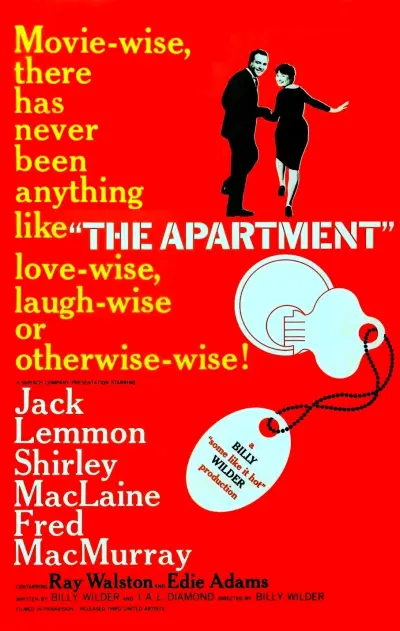
The Apartment, a classic gem from the storied year of 1960, stands as a masterful blend of sharp comedy and poignant drama under the direction of the legendary Billy Wilder. The film narrates the tale of C.C. "Bud" Baxter, an insurance clerk, who aspires to ascend the corporate ladder. In his quest for advancement, he lends his Upper West Side apartment to company executives for their extramarital encounters. The inimitable Jack Lemmon brings life to Bud, offering a portrayal that is imbued with charm, perfectly timed comedy, and a touch of the tragic hero.
As the narrative unfolds, Bud becomes enmeshed in the tangled web of his superiors' affairs. At the core of the story is the delicate and intricately woven relationship between Bud and the elevator operator Fran Kubelik, portrayed by Shirley MacLaine. Their unlikely romance serves as a poignant counterpoint to the unsavory activities that occur within the apartment's confines, and presents a compelling exploration of loneliness and the human yearning for authentic connections amidst a backdrop of moral insolvency in the corporate milieu.
The Apartment transcends the boundaries of a mere love story, offering instead a scathing social critique of the corporate rat race and the commodification of personal relationships. Within the narrative, Bud's apartment stands as an allegory for the battle for one's soul in an age rife with unscrupulous ambition. In Bud's struggle to resist the moral decay pervasive in his environment, the film finds its dramatic tension. This struggle is emblematically reflected in the towering concrete canyons of New York, the setting which acts almost as a character in itself.
The film's insightful dissection of gender roles and the treatment of women in the workplace is central to its impact, with Fran Kubelik's story arc particularly poignant. She must maneuver through a world where her worth is frequently diminished to her allure and her servility to the demands of influential men. Through her tribulations and determination, the film injects a sense of hope into its otherwise dark tableau, which Wilder deftly mitigates with his trademark blend of humor and subtlety.
The Apartment's charm is rooted in its intelligent screenplay and Wilder's adept handling of the precarious balance between cynicism and romance. The eponymous apartment, often depicted in solitude, emerges as a symbol of both the isolation and anonymity of urban existence. Wilder's depiction of New York teems with life and is densely populated, yet its citizens are profoundly isolated. Each character is in search of something greater, with the apartment serving alternately as both haven and confinement, depending on the context of the scene.
Concluding with a tone that is neither excessively optimistic nor despondent, The Apartment encapsulates its thematic threads with a touch of festive melancholy. The closing scene leaves the audience reflecting on the true price of integrity, both to oneself and to others, and on the intrinsic worth of decency in a world that frequently lauds the contrary. The final, memorable exchange of "Shut up and deal," resonates beyond its subdued romanticism, also encapsulating life's inherent complexities and the risks we undertake. The film lingers in the consciousness akin to the haunting aftereffect of a beloved song, enduring long after the last note has faded.
As the narrative unfolds, Bud becomes enmeshed in the tangled web of his superiors' affairs. At the core of the story is the delicate and intricately woven relationship between Bud and the elevator operator Fran Kubelik, portrayed by Shirley MacLaine. Their unlikely romance serves as a poignant counterpoint to the unsavory activities that occur within the apartment's confines, and presents a compelling exploration of loneliness and the human yearning for authentic connections amidst a backdrop of moral insolvency in the corporate milieu.
The Apartment transcends the boundaries of a mere love story, offering instead a scathing social critique of the corporate rat race and the commodification of personal relationships. Within the narrative, Bud's apartment stands as an allegory for the battle for one's soul in an age rife with unscrupulous ambition. In Bud's struggle to resist the moral decay pervasive in his environment, the film finds its dramatic tension. This struggle is emblematically reflected in the towering concrete canyons of New York, the setting which acts almost as a character in itself.
The film's insightful dissection of gender roles and the treatment of women in the workplace is central to its impact, with Fran Kubelik's story arc particularly poignant. She must maneuver through a world where her worth is frequently diminished to her allure and her servility to the demands of influential men. Through her tribulations and determination, the film injects a sense of hope into its otherwise dark tableau, which Wilder deftly mitigates with his trademark blend of humor and subtlety.
The Apartment's charm is rooted in its intelligent screenplay and Wilder's adept handling of the precarious balance between cynicism and romance. The eponymous apartment, often depicted in solitude, emerges as a symbol of both the isolation and anonymity of urban existence. Wilder's depiction of New York teems with life and is densely populated, yet its citizens are profoundly isolated. Each character is in search of something greater, with the apartment serving alternately as both haven and confinement, depending on the context of the scene.
Concluding with a tone that is neither excessively optimistic nor despondent, The Apartment encapsulates its thematic threads with a touch of festive melancholy. The closing scene leaves the audience reflecting on the true price of integrity, both to oneself and to others, and on the intrinsic worth of decency in a world that frequently lauds the contrary. The final, memorable exchange of "Shut up and deal," resonates beyond its subdued romanticism, also encapsulating life's inherent complexities and the risks we undertake. The film lingers in the consciousness akin to the haunting aftereffect of a beloved song, enduring long after the last note has faded.

